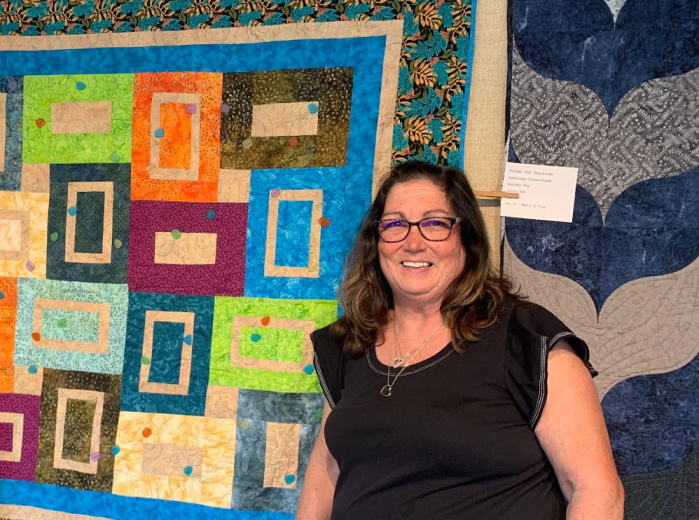 The hot-button debate of getting children vaccinated isn’t going away any time soon. With anti-vaxxers protesting that injecting bacteria into the human body is wrong for several reasons, some of them may not even know the details or consequences of not getting immunized. One woman has made it her life’s mission to shed light on how crucial vaccinations are, after an unspeakable tragedy resulted in the loss of her teenage daughter.
The hot-button debate of getting children vaccinated isn’t going away any time soon. With anti-vaxxers protesting that injecting bacteria into the human body is wrong for several reasons, some of them may not even know the details or consequences of not getting immunized. One woman has made it her life’s mission to shed light on how crucial vaccinations are, after an unspeakable tragedy resulted in the loss of her teenage daughter.
Patti Wukovits is a medical professional and executive director of the Kimberly Coffey Foundation (www.kimberlycoffeyfoundation.org), which was established after the death of her daughter Kimberly, who contracted Meningitis B several years ago.
“In 2012, Kimberly was a vibrant, perfectly healthy 17-year-old high school senior, looking forward to prom and graduation as well as starting her nursing education. I made sure she received the routine meningitis vaccine (MenACWY), and like most parents, I thought she was fully immunized against bacterial meningitis,” said Wukovits of her daughter, who did not realize that the MenACWY vaccine does not include protection against Meningitis B. “It was not until 2014 that Meningitis B vaccines became available in the U.S. My daughter contracted this now vaccine-preventable disease two years too early because I could not protect her in 2012. Had a vaccine for Meningitis B been available before 2014, my daughter would have been vaccinated. She would still be alive today living her dream as a pediatric nurse taking care of children and helping them live healthy lives by preventing disease with vaccination. Instead, I buried my daughter two days before her high school graduation in the prom dress she did not have the chance to wear.”
 You are an advocate for vaccinations in a time when many people are choosing to be anti-vaxxers. Why is this dangerous?
You are an advocate for vaccinations in a time when many people are choosing to be anti-vaxxers. Why is this dangerous?
 I advocate for vaccination every single day to help prevent another child or family from experiencing the dangerous effects of vaccine-preventable diseases. It’s risky for teens not to get vaccinated against diseases such as HPV and meningitis. As a mother who lost my 17-year-old, healthy daughter to a now vaccine-preventable disease, I know first-hand the devastating consequences of not being protected by vaccination. As a chemotherapy nurse, I have administered chemotherapy to many women with cervical cancer caused by HPV who did not have the opportunity to be vaccinated earlier in their lives because the HPV vaccine had not been available to help protect them.
I advocate for vaccination every single day to help prevent another child or family from experiencing the dangerous effects of vaccine-preventable diseases. It’s risky for teens not to get vaccinated against diseases such as HPV and meningitis. As a mother who lost my 17-year-old, healthy daughter to a now vaccine-preventable disease, I know first-hand the devastating consequences of not being protected by vaccination. As a chemotherapy nurse, I have administered chemotherapy to many women with cervical cancer caused by HPV who did not have the opportunity to be vaccinated earlier in their lives because the HPV vaccine had not been available to help protect them.

 Vaccines aren’t just for infants; adolescents and adults need to be protected against disease as well. August is National Immunization Awareness Month, so how can we shed light on the importance of vaccinations for teens?
Vaccines aren’t just for infants; adolescents and adults need to be protected against disease as well. August is National Immunization Awareness Month, so how can we shed light on the importance of vaccinations for teens?
 Getting all of the recommended vaccines is one of the most important things a parent can do to protect their child’s health. Giving the HPV vaccine to teens now helps protect them against six types of cancer later in life: cervical, vulvar, vaginal, penile, oropharyngeal and anal. HPV is the most common sexually transmitted infection. The key is to get vaccinated as a teen before they are exposed to HPV.
Getting all of the recommended vaccines is one of the most important things a parent can do to protect their child’s health. Giving the HPV vaccine to teens now helps protect them against six types of cancer later in life: cervical, vulvar, vaginal, penile, oropharyngeal and anal. HPV is the most common sexually transmitted infection. The key is to get vaccinated as a teen before they are exposed to HPV.
Meningococcal disease—more commonly known as bacterial meningitis—is a life-threatening bacterial infection that can affect the lining of the brain and spinal cord or can cause an infection in the bloodstream. Meningococcal bacteria are transmitted through the exchange of saliva, which puts teens and young adults at increased risk as their social behaviors lend to sharing saliva. There are two types of meningitis vaccines. The more common meningitis vaccine (MenACWY) is given at age 11 and a booster at age 16, which helps protect against types A,C,W and Y. The other meningitis vaccine is the Meningitis B vaccine (MenB), which is recommended for ages 16 to 23. MenB is an additional vaccine and most have not received it as it has only been available since 2014. Without it, you will not be fully vaccinated against the five most common types of meningococcal bacteria.
 Do you think technology and social media has helped or made worse the importance of vaccination?
Do you think technology and social media has helped or made worse the importance of vaccination?
 Social media is a wonderful platform to promote the importance of vaccination as long as accurate information is provided by credible groups and organizations. It’s critically important that people check the credibility of claims and views about vaccination posted by non-medical individuals and groups, such as celebrities and public figures. For credible and accurate vaccine information, I recommend organizations such as Vaccinate Your Family, the CDC and Nurses Who Vaccinate. For accurate and credible information about meningococcal disease and meningococcal vaccines, people may visit The Kimberly Coffey Foundation and The Meningitis B Action Project.
Social media is a wonderful platform to promote the importance of vaccination as long as accurate information is provided by credible groups and organizations. It’s critically important that people check the credibility of claims and views about vaccination posted by non-medical individuals and groups, such as celebrities and public figures. For credible and accurate vaccine information, I recommend organizations such as Vaccinate Your Family, the CDC and Nurses Who Vaccinate. For accurate and credible information about meningococcal disease and meningococcal vaccines, people may visit The Kimberly Coffey Foundation and The Meningitis B Action Project.
 Aside from various illnesses and risk to others, what are the consequences of not being vaccinated? What does this decision prohibit kids from taking part in?
Aside from various illnesses and risk to others, what are the consequences of not being vaccinated? What does this decision prohibit kids from taking part in?
 The challenge for public health officials right now is that many people are more afraid of the vaccines than the diseases, because they’ve been lucky enough to have never seen the diseases and their devastating impacts. But it’s not luck. It’s the result of many years of collective vaccination efforts. The New York State meningitis vaccine school requirement is for the MenACWY vaccine only—leaving teens unprotected against Meningitis B. It is also important to know that Meningitis B has been responsible for all meningitis college campus outbreaks since 2011.
The challenge for public health officials right now is that many people are more afraid of the vaccines than the diseases, because they’ve been lucky enough to have never seen the diseases and their devastating impacts. But it’s not luck. It’s the result of many years of collective vaccination efforts. The New York State meningitis vaccine school requirement is for the MenACWY vaccine only—leaving teens unprotected against Meningitis B. It is also important to know that Meningitis B has been responsible for all meningitis college campus outbreaks since 2011.
Vaccination not only protects the individual, but through community immunity, it also protects others who cannot be vaccinated due to medical conditions. The immunocompromised depend on others to be vaccinated, and this is especially important in the school setting. Simply put, vaccines are safe and effective, and vaccines save lives.



























